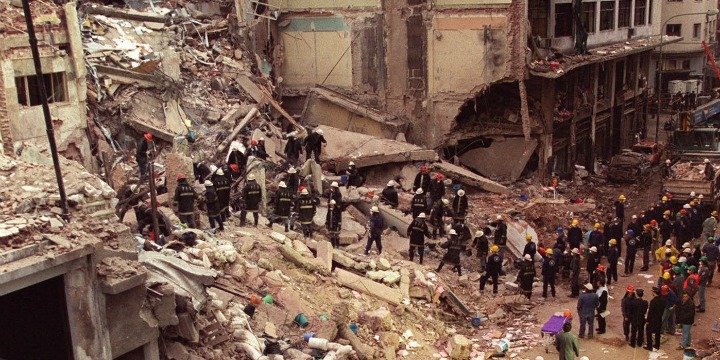

The aftermath of the bombing of the AMIA building in Buenos Aires on July 18, 1994. Photo: File.
The US State Department is offering rewards for information on Hezbollah’s financial networks in Latin America, with a particular focus on the Tri-Border Area — where Paraguay, Argentina, and Brazil intersect and illicit activity is known to thrive.
In a statement released Monday, the department’s Rewards for Justice program announced it is offering up to $10 million for information that disrupts “the financial mechanisms of the terrorist organization.”
The Iran-backed Lebanese terrorist group “generates about $1 billion annually from a combination of direct financial support from Iran, international businesses and investments, donor networks, corruption and money laundering activities,” the statement reads.
Hizballah operates in regions far from its base in Lebanon, including in South America.
If you have information on Hizballah smuggling, money laundering, or other financial mechanisms in the Tri-Border Area, contact us. You could be eligible for a reward and relocation. pic.twitter.com/dYFq1gwQB3
— Rewards for Justice (@RFJ_USA) May 19, 2025
Among other activities, the US alleges that the terror group funds its operations through money laundering, drug trafficking, smuggling charcoal and oil, illegal diamond trading, document forgery, counterfeiting US dollars, and trafficking large amounts of cash, cigarettes, and luxury goods across the three countries, the US alleges.
According to the department’s spokesperson, Tammy Bruce, the US government is requesting information on businesses or investments linked to Hezbollah or its financial facilitators, front companies involved in procuring dual-use technology for the terrorist group, and criminal activities by Hezbollah members and supporters that help fund their operations.
Iran is the chief international backer of Hezbollah, as well as the Palestinian terrorist group Hamas and Yemen’s Houthi militants, providing these Islamist groups with weapons, funding, and training.
The US officially designated Hezbollah as a Foreign Terrorist Organization (FTO) in 1997 and later as a Specially Designated Global Terrorist (SDGT) group in 2001, while Iran was classified as a State Sponsor of Terrorism in 1984.
The Tri-Border Area in South America has long been regarded as a financial hub for Hezbollah operatives and continues to be a hotspot for organized crime across the region.
Argentina experienced the two deadliest terrorist attacks in the region — the 1992 bombing of the Israeli embassy and the 1994 attack on the Argentine-Israeli Mutual Association (AMIA) Jewish community center in Buenos Aires — both of which Argentine authorities attribute to Hezbollah, with support and direction from Iran.
In April, the lead prosecutor in the 1994 AMIA Jewish community center bombing case petitioned Argentina’s federal court to issue national and international arrest warrants for Iran’s Supreme Leader, Ayatollah Ali Khamenei, over his alleged involvement in the terrorist attack.
Sebastián Basso — who succeeded former prosecutor Alberto Nisman after his murder in 2015 — argued that Khamenei was directly involved in planning the 1994 AMIA bombing — the deadliest terrorist attack in Argentina’s history, in which 85 people were killed and more than 300 wounded.
In 2006, Nisman formally charged Iran for orchestrating the attack and the regime’s chief proxy, Hezbollah, for carrying it out. Nine years later, he accused former Argentine President Cristina Fernández de Kirchner of attempting to cover up the crime and block efforts to extradite the suspects behind the AMIA atrocity in return for Iranian oil.
The alleged cover-up was reportedly formalized through a Memorandum of Understanding signed in 2013 between Kirchner’s government and Iranian authorities, with the stated goal of cooperating to investigate the AMIA bombing.
Last year, Argentina’s second-highest court ruled that the 1994 attack in Buenos Aires was “organized, planned, financed, and executed under the direction of the authorities of the Islamic State of Iran, within the framework of Islamic Jihad.” The court also said that the bombing was carried out by Hezbollah terrorists responding to “a political and strategic design” by Tehran.
The court additionally ruled that Iran had been responsible for the 1992 truck bombing of the Israeli embassy in Buenos Aires, which killed 29 people.




